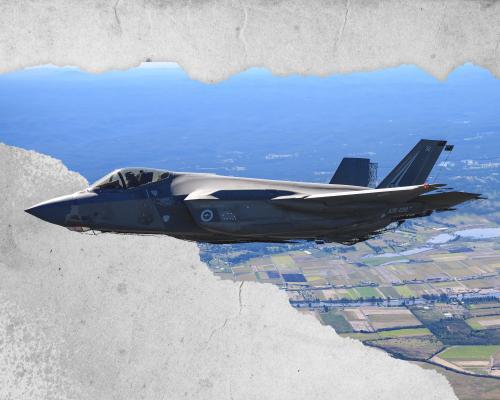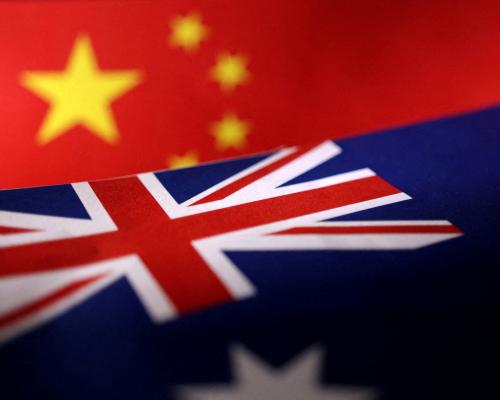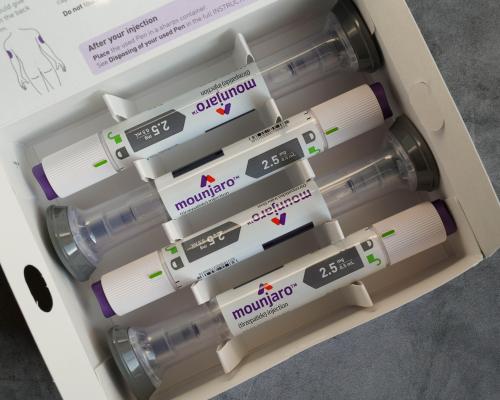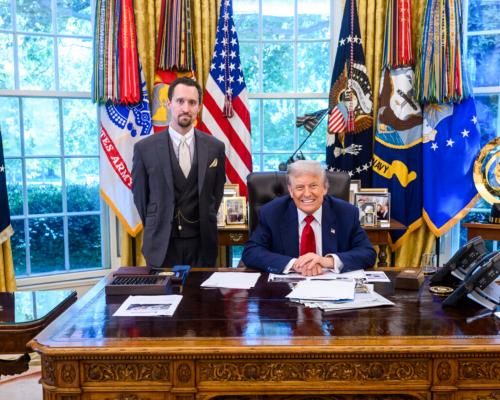
The Australian government has announced it will recognise the state of Palestine, but many politicians and human rights groups are demanding tougher action to end the humanitarian crisis in Gaza.
The Greens have urged the Albanese government to stop supplying F-35 parts to a global supply chain that can be accessed by Israel, in addition to direct sanctions on senior members of the Netanyahu government.
But the federal government denies it is sending weapons to Israel and has criticised “misinformation” about the F-35s. So what do we know about Australia’s role in the supply chain?
Does Israel use F-35s?
The Israel Defense Forces has confirmed F-35 planes are used to “strike terror targets and assist ground forces in very close proximity strikes”.
In February last year, a Dutch appeals court found it was likely that F-35s were being used in attacks on Gaza, and a “clear risk” that parts exported from the Netherlands were “used in serious violations of international humanitarian law”.
Sign up: AU Breaking News email
In September, Danish media reported Israel had confirmed an F-35 was used in a missile strike in southern Gaza that killed 90 people and injured hundreds more.
Lawyers representing the Palestinian human rights group Al-Haq have previously told a UK court the F-35s have played a critical role in Gaza and linked them to airstrikes that have killed more than 400 people, including 183 children and 94 women.
The Israeli government was contacted for comment.
What is Australia supplying?
More than 75 Australian companies have contributed to the global supply chain for the F-35 program, according to the defence department. More than 700 of the fighter jet’s “critical pieces” are manufactured in Victoria alone, according to the state government.
One company, RUAG Australia, is the only global supplier of the F-35’s “uplock actuator system”, which allows the jet to quickly open its bay doors and fire missiles while maintaining stealth. Australia also hosts a regional distribution hub for F-35 parts.
In April, the defence department said Australian companies have been paid around $5bn for their contributions to the F-35 supply chain so far. This is a relatively small proportion of the overall program. Last year, the US government accountability office said the F-35s would cost “more than $2tn over several decades”.
Who are we supplying?
The global supply chain is coordinated by the F-35’s primary manufacturer Lockheed Martin in the US. The fighter jet is used by the US and 19 allies, including the UK, Canada, Australia, Germany, Japan and South Korea.
Manufacturers are not contracted to supply parts to one specific nation, such as Israel. Instead, they supply enough parts for large batches of F-35s that are purchased from Lockheed Martin.
In July, the Declassified website published a story alleging dual civilian and military use aircraft parts had been sent from Sydney to Tel Aviv. The story cited shipping records that allegedly listed Lockheed Martin as the source of the parts and described them as being for the “JSF”, or the F-35 joint strike fighter.
An Australian government spokesperson said it “does not have a direct bilateral arrangement with the government of Israel in relation to the F-35 program”.
“Australia has not supplied weapons or ammunition to Israel since the Israel-Gaza conflict began and not for at least the past five years,” the spokesperson said.
Lockheed Martin was contacted for comment on whether F-35 parts were sent from Australia to Israel directly.
How quickly could other countries replace Australian parts?
Parts can only be sourced from nations allied with the US due to national security fears. In 2022, deliveries were briefly suspended when Chinese parts were discovered in an F-35.
“Replacing such suppliers would not be straightforward, as Lockheed would have a limited list of countries from which to source components,” said Kelsey Gallagher, a senior researcher with the Canada-based research institute Ploughshares, who specialises in the F-35 supply chain.
“A country like Australia refusing to transfer F-35 components could have a sizeable impact on the program, given how many individual aircraft they are contracted to supply at once,” Gallagher said.
Would withholding parts have an impact?
It depends on the parts. Several Australian companies are the sole global supplier for some F-35 parts. If these parts were withheld, there could be a significant short-term impact on repairs and sales.
Last year, Lockheed Martin told a US court that one relatively small supplier not providing titanium products, as contracted to do so, would “cause unavoidable and substantial delays in Lockheed Martin’s delivery of F-35 aircraft to the United States, threatening national security and Lockheed Martin’s reputation and goodwill”.
Josh Paul, a former US state department official who resigned over US arms shipments to Israel, says the impact would be greatest if nations acted together in protest against the killing in Gaza.
“The nature of the [F-35] consortium is that all of the countries would feel the crunch and therefore feel compelled to accept that agreement,” Paul told the ABC.
If we did withhold parts, would companies be fined?
Gallagher said most of the contracts between Lockheed Martin and small companies, including subcontractors in Australia, were not public and it was difficult to make claims with certainty. But he referred to a 2025 Lockheed Martin corporate document that told suppliers their “timely performance is a critical element” of their contracts.
“Logically, a subawardee failing to supply parts following a contract signing could only be seen as a breach of that contract, whatever the reason,” Gallagher said.
In 2023, Lockheed Martin sued US-based subcontractor Howmet for failing to deliver F-35 components after a contract dispute. The matter was settled out of court and Howmet continues to supply parts.
Gallagher said Lockheed Martin faces financial penalties from the US department of defence for failing to deliver jets on time.
“It could then follow that Lockheed would pass those penalties onto subcontractors that have some part in the delays,” Gallagher said.
What have other countries done?
So far, no country has withdrawn from the F-35 supply chain. But several companies have taken action to reduce or cut the supply of new military equipment to Israel.
Germany has stopped exporting material that could be used by Israel during its military operations in Gaza. Germany is the second largest arms supplier to Israel after the US.
Australia’s defence minister, Richard Marles, says Australia cannot announce similar action to Germany as it does not directly supply arms to Israel. Regarding the F-35 parts, he said on Sunday: “That is a multilateral arrangement with supply chains that are organised by Lockheed Martin in the United States and have multiple suppliers in respect of all of those supply chains.”
The German company Rheinmetall produces fuselages for the global F-35 supply chain. These contributions have not been stopped.
In September, the UK suspended most relevant arms export licences for use in Israel.
Would withholding parts threaten national security?
Some nations think so, but this is difficult to independently substantiate.
When the UK suspended arms export licenses, it gave a carve-out to the F-35 program, saying international peace and security required that it was not disrupted. The UK is the second largest supplier of parts after the US.
The UK government told a court that suspending exports to the F-35 program would have impacted the battle to prevent Russia from occupying Ukraine, as the F-35 was a central pillar of Nato.
The Australian government is required to make similar judgments before awarding export licences for parts used in the F-35. It must consider 12 criteria, including the balance between human rights concerns and national security and foreign policy considerations.
What does the law say?
Under the arms trade treaty, which Australia is a party to, providing weapons to a group involved in armed conflict can lead to criminal liability if the equipment is used to commit war crimes.
In January last year, the international court of justice ruled the claim of genocide in Gaza was “plausible”.
The Greens senator David Shoebridge says component parts are considered weapons and Australia is therefore breaching international law.
But Donald Rothwell, an international law expert at the Australian National University, says he would “not be as decisive” as Shoebridge in his interpretation of international law. Rothwell said being definitive was difficult as “there can be so many component parts of weapons”.
“Some component parts may have been exported to Israel for civilian use but then utilised for weapons,” Rothwell says. “I would take the view, though, that Australian exports that are component weapon parts, and which are exported to the IDF, are contributing to the Israeli military campaign in Gaza.”
Paul told the ABC last week that Australia’s supply of components and parts to the F-35 fighter jets, which have been used by Israel, constitutes “directly the facilitation of war crimes”.
During a recent court hearing, the UK government acknowledged its supply of F-35 components for potential use in Israel was in breach of its own arms export control laws. Around 15% of the F-35’s parts, including ejection seats, are made in the UK.
What do human rights groups say?
The Australian Centre for International Justice, a non-profit legal centre, says Australia’s role in the supply chain “raises grave concerns that Australian parts and components are involved in the atrocities we have seen unfold in Gaza”.
Amnesty International Australia’s Mohamed Duar has said “the lack of transparency surrounding Australia’s defence exports has made it extremely difficult to determine the extent of our involvement in the commission of genocide and war crimes”.
Human Rights Watch was among 232 civil society organisations who urged nations involved in the F-35 supply chain to “immediately halt all arms transfers to Israel”.
What does the Australian government say?
Marles says Australia does not supply weapons to Israel and has complained about “misinformation” regarding exports, arguing it has “raised tensions in this country, which is deeply destabilising for Australia’s social cohesion”.
Marles says Australia has contributed to the F-35 program for decades as part of a multi-lateral agreement with Lockheed Martin in the US, rather than Israel directly.
The foreign affairs minister, Penny Wong, has also described Australia’s contributions to the supply chain as “non-lethal in nature”.







